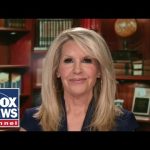In the midst of an election season filled with heated discussions and debates, a significant controversy has erupted in the Commonwealth of Virginia. Governor Glenn Youngkin is currently confronting the Department of Justice (DOJ) regarding a long-standing state law that aims to ensure clean and accurate voter rolls. This situation stems from a bill passed in 2006, which mandates the removal of individuals who self-identify as non-citizens from the voting rolls if they cannot prove their citizenship within a specified timeframe. The governor insists that this legislation is necessary to maintain the integrity of elections, but the DOJ’s recent lawsuit has raised significant concern.
The process is relatively straightforward. When someone identifies themselves as a non-citizen at the Department of Motor Vehicles (DMV), that information is logged, and if they are also registered to vote, officials notify them that they must confirm their citizenship. Failing to do so within 14 days leads to their removal from the voter rolls. Youngkin emphasizes that this is a matter of common sense; after all, if you need an ID to attend a presidential debate or visit the White House, why should the same standards not apply to voting? However, the DOJ has intervened just weeks before the November election, arguing that removing voters too close to an election violates federal law under the National Voter Registration Act (NVRA), which prohibits systematic purges within 90 days of a federal election.
This unexpected interference has led to deeper questions about the motivations behind the resistance to voting identification requirements. Governor Youngkin points to discrepancies in the Democrats’ stance on voter ID laws, raising the issue of why the party insists on opposing such measures while demanding credentials for their events. The inconsistency is hard to overlook. If Democrats see the need for security in their gatherings, why not extend the same standards to the electoral process, which is arguably even more critical?
Youngkin also expressed his concerns over the broader implications, indicating that the DOJ’s actions reflect a troubling trend undermining public confidence in election integrity. In his view, ensuring clean voting rolls is a constitutional obligation and a commonsensical approach to governance. The governor has removed over 6,300 non-citizens and 80,000 deceased individuals from the voter rolls since taking office, demonstrating a commitment to accuracy. However, opponents, including the DOJ, argue that these removals risk mistakenly disenfranchising legitimate voters, especially in the lead-up to an election.
As the political landscape heats up, the stakes continue to rise for the upcoming elections. With voters increasingly critical of the Biden administration’s policies, particularly regarding inflation, border security, and public safety, Republican candidates like Youngkin are seizing the moment to rally support. The narrative framing is crucial; as citizens grapple with rising costs and concerns over safety, the call to action is clear: voters must head to the polls and make their voices heard. Youngkin encourages early voting to ensure that each individual’s opinion counts, underlining the notion that elections have consequences and the American public has the power to shape policy and direction.
In an age fraught with division, it’s apparent that discussions around voter identification and election integrity are more than just political talking points; they represent the foundation of trust in the electoral system. As these conversations unfold, Virginia’s experience stands as a compelling case study, illustrating the intersection of law, ethics, and the ever-evolving landscape of American politics. The outcome of this conflict may not only influence elections in Virginia but could also set a precedent for how voter integrity laws are addressed nationwide.




